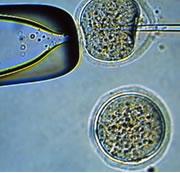 Cloning: perhaps stem cells aren't the easiest option.SPL
Cloning: perhaps stem cells aren't the easiest option.SPLBy cloning two mice from cells fated never to divide again, researchers in the United States have defied the notion that cloning mammals is easiest from stem cells, or other cells that are still dividing.
In cloning, researchers use a technique called somatic cell nuclear transfer, in which the nucleus of a cell, such as a skin cell, is inserted into an egg stripped of its own nucleus. This process is thought to reprogramme the DNA in the nucleus, effectively overwriting the genetic programme that makes it behave as a skin cell and replacing it with one that can orchestrate the development of an embryo.
It was thought that stem cells, which have the capacity to turn into many cell types, are easier to reprogramme and so should be better for cloning. Their genetic programme is considered to be less engrained than that of cells that have already differentiated and so are committed to being skin, blood, brain or bone for the rest of their lives.
Jerry Yang of the University of Connecticut in Storrs, Tao Cheng of the University of Pittsburgh, Pennsylvania, and their team tested this idea using fresh mouse blood cells at three different stages of differentiation.
All grown up
One group of stem cells were differentiated very little and were able to give rise to all blood cell types; a second had differentiated to the stage where they could make only a handful of cell types; and a third group was composed of completely differentiated white blood cells called granulocytes.
The team found that the granulocytes —the most differentiated cells — were actually easiest to clone, they report in Nature Genetics1. Some 35% of attempts to clone these cells grew into young embryos after nuclear transfer, and two eventually developed into animals that were born but died. In comparison, just 11% of clones from intermediate cells, and less than 8% of those from the least differentiated stem cells, grew into embryos. "It was very surprising," Yang says.
Yang notes the result might be of interest to researchers who hope, in future, to clone a patient's cells and use the resulting embryo to extract human embryonic stem cells and treat disease. The results show that it might be possible to obtain a patient's nucleus from the cells in a simple blood sample, rather than having to use special stem cells.
Spot the difference
Unfortunately, researchers are unsure why these differentiated blood cells are easier to clone than the blood stem cells.
It is possible that the granulocytes contain some particular mix of biochemical factors that makes them easier to clone. Or the blood stem cells might have properties that make them more difficult to clone than other stem cells, says Ian Wilmut of the University of Edinburgh, UK, who led the team that cloned Dolly the sheep. It is well established that cloning from embryonic stem cells has a much higher success rate than most other cell types.
"It's certainly a surprise," says Wilmut of the work. "People should look at different cell types with a more open mind," he says.
Hard cells
Researchers are still struggling to understand what makes it possible to clone one type of cell and not another, or even two cells of the same type. Cloning adult cells is notoriously difficult and inefficient, and many cloned mammals are abnormal or die.
ADVERTISEMENT
Scientists have long debated whether cloning from adult tissues is inefficient because reprogramming doesn't work very well, or because clones produced this way grow from rare stem cells lurking among all the differentiated cells. (Dolly was cloned from a cell from adult mammary gland, but whether it was a fully differentiated cell or a stem cell is not known.)
This study hints that the first notion may be correct. Much recent work has been targeted at trying to make such adult cells easier to reprogramme (see, for example, '"Simple recipe gives adult cells embryonic powers": http://www.nature.com/news/2006/060703/full/442011a.html').
Visit our growncellsyieldclones.html">newsblog to read and post comments about this story.
